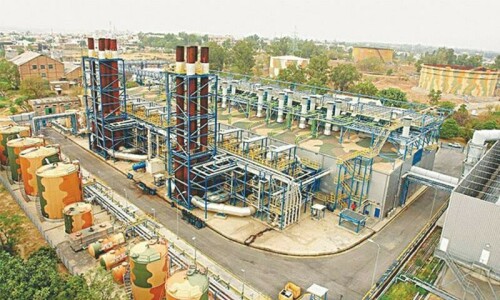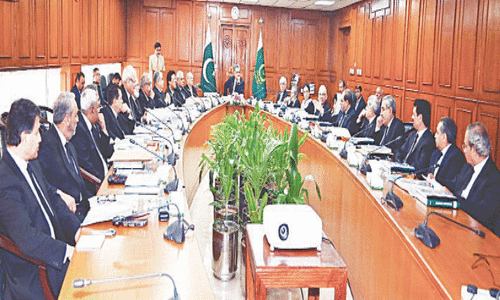PAKISTAN is the land where secrets of the political realm are the worst kept and it is also the land where the worst does come true. In a blitzkrieg of a move, the ECP announced on the night of March 22 that it was postponing the elections announced for Punjab for April 30.
Shortly after, Ramazan was also announced at 10:30pm, by which time most people were thinking they had another day before the fasting was to begin. Our moon sighting has always been a political affair, but it became more political on Tuesday night than one had realised.
The ECP decision was perhaps to be expected, considering the joint session of the parliament the day before, where the interior minister had also made a case for a possible delay in the elections.
Barrister Asad Rahim Khan, calls both the reasoning of the ECP and the government, “scattershot”, arguing that there is no consistent reasoning for the delay.
Obviously, this throws up a number of challenges, legal as well as political. Nonetheless, the first is about the Supreme Court which had bound the ECP to hold elections within 90 days (as if the Constitution wasn’t enough of a bind). The PTI has already announced it will be challenging the order in the court today (Friday). And while, many assume the Court will also stand by its earlier order, the politics does not make the situation any easier.
A supreme question of law
The SC now faces a challenge which, can perhaps be compared to the 2007 one, where the apex court was faced with a government and establishment that were on the same page.
That moment ended in an emergency; this one is yet to play out. And this one page is the reason PTI may not get the quick relief it is announcing publicly.
The court is already being critiqued by those in government, so any decision it gives now will be accused of bias. Couple this with the stakeholders on the other side of the ‘divide’ and Salahuddin Ahmed, lawyer and the former president Sindh Court Bar Association, says only a full bench judgement may have the moral legitimacy to ensure elections.
Both he and Mr Khan agree that given the government’s onslaught against the judges and the difference of opinion within the court, which became rather public when the chief justice took suo motu notice of the matter, the court does not face an easy time.
But beyond this, there is also the matter of the caretaker governments, which do not have the mandate to stay beyond 90 days. Who will now provide the legal cover here, or will this need simply be brushed off, as has the criticism about delaying decision.
Or for that matter, the precedent being set (political and legal) of the federal government and its subordinate departments having the power to delay or deny an election to a provincial chief minister, who has dissolved an assembly.
Mustafa Khokhar, a lawyer and former senator, says: “The provisions relating to the chief minister’s right to dissolve the assembly have been made meaningless and the caretakers who have no role beyond the 90 day period have been given several months extra in office. This is a mockery of the constitution.”
The coming days will see nonstop discussion on these issues.
However, legal niceties aside, this is essentially a political matter. And this is where Islamabad is already swamped by questions about whether the date in October might also become just a date on the calendar, as it now appears April 30 is.
For the legal reasoning and niceties aside, realpolitik is always at work behind the scenes where the real answers are to be found. Elections are to be delayed because PTI is far too popular and because the decision to block its ascension has been made by the establishment, even if the PML-N thinks it is benefitting from this conflict. None of this will change by October.
The people’s anger
The economic situation and crippling inflation, along with widespread unemployment, is adding to Imran Khan’s appeal in the face of what is seen as the status quo.
This is not going to change, however much the government points to the leaked audio of Yasmin Rashid where she is allegedly telling Ejaz Shah, the former PTI interior minister that Imran Khan will not give party tickets to those who do not bring people to Zaman Park.
Uzair Younis, director of the Atlantic Council’s Pakistan Initiative, says “a major turnaround in Pakistan’s economic fortunes is unlikely”.
And for him, this is not just because of the larger context, but also the government’s choices. “If I was a betting man, I would bet on them making the same poor choices that have exacerbated the crisis in the country,” he adds.
The political reasons behind the delay might not improve till October. But more serious still, the PDM coalition government and especially the PML-N will continue to face the “threat” of an election, which will keep them, as Mr Younis had said, from making any long-term decision to address the structural issues of the economy.
This in itself is evident from the government’s new offer of a subsidy to motorbikes by charging a higher price to the car owners. This has been flagged rather harshly by no less than the IMF’s Pakistan representative, Esther Ruiz, who told the media that a “staff-level agreement would follow once the remaining points, including the authorities’ recently announced fuel subsidy scheme, are closed”.
The point here is the economic crisis and Imran Khan’s own style of politics is not going to allow any stability between now and October. He will be compelled to hit the streets and unemployment and inflation are going to ensure people flock to him.
Consider that a colleague recently said he knew people from interior Sindh who ended up at Zaman Park because they had no work and not much to eat. Even if Mr Khan is somehow prevented from any agitation, how will this help the people. Outside of politics, street crime is increasingly rapidly, everywhere.
Rules of transition
This is obvious within and is also not lost on those watching Pakistan from the rest of the world. A former Saudi ambassador to Pakistan recently wrote an opinion piece where he suggested all political stakeholders should agree to basic rules of the game, for the sake of stability.
Though the ambassador was offering his advice to political parties, the reality is that Pakistan’s instability is caused by far more than just the politicians. And if elections are to provide the rules by which government changes hands, all other stakeholders will also have to agree to play by them. For elections on their own are not enough; this particular spate of instability began in 2017, while 2022 simply turned it into a ride down a mountain without any brakes.
And if the people’s misery is not enough to convince our leadership, perhaps they should think of what happens when countries grow weak – their history is then written by others and the judgements made by outsiders will be very harsh. And we will not able to drown it out by opening multiple Pemra-run channels.
Published in Dawn, March 24th, 2023














































